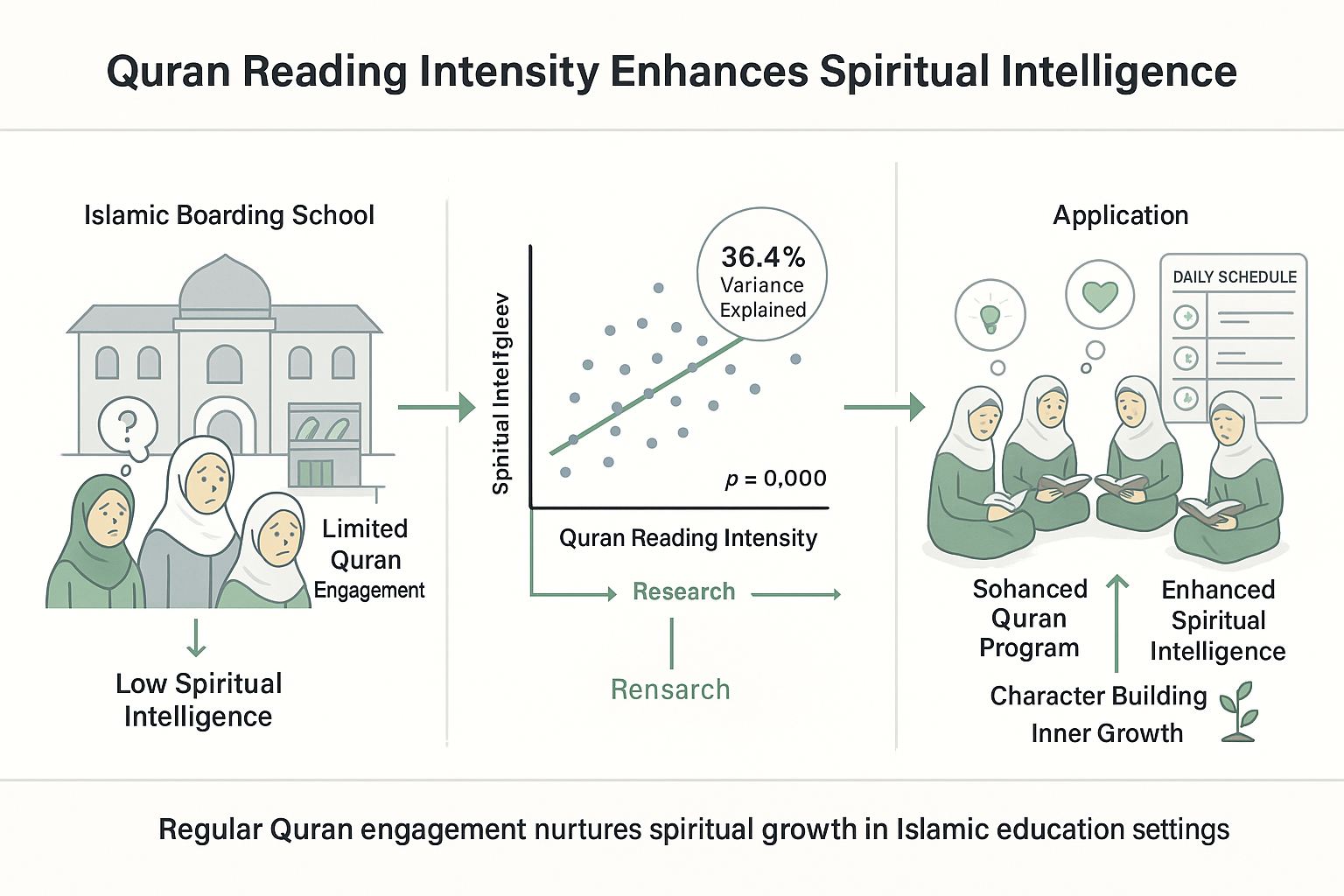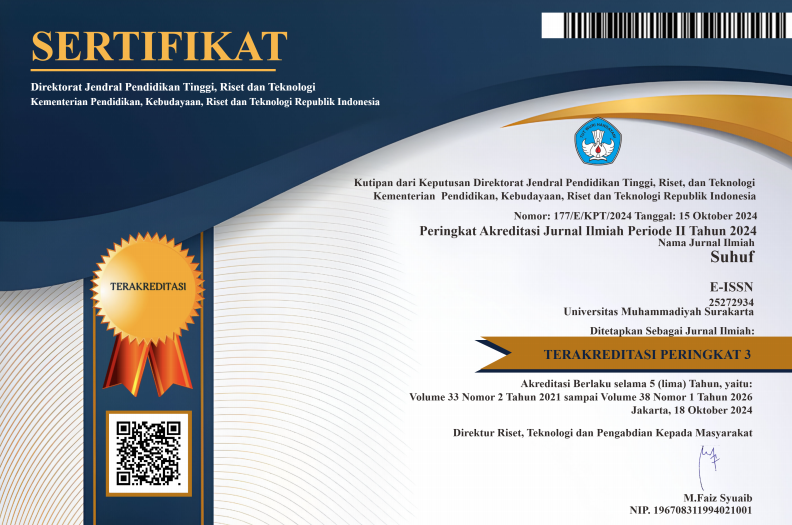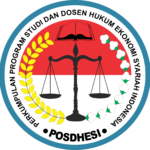Exploring the Impact of Qur’anic Recitation Intensity on the Spiritual Intelligence of Female Islamic Boarding School Students
DOI:
https://doi.org/10.23917/suhuf.v37i1.10105Keywords:
Spiritual intelligence, Qur'an reading, Islamic boarding school, Santriwati, Character educationAbstract
This study was motivated by the low manifestation of spiritual intelligence among santriwati at Al-Wafa Putri Islamic Boarding School in Palangka Raya, despite the implementation of Quran reading and memorization programs. The aim of the research is to determine the effect of Quran reading intensity on students’ spiritual intelligence. Using a quantitative method with a correlational approach, hypothesis testing showed a significance value of p = 0.000, indicating a strong positive relationship between Quran reading intensity and spiritual intelligence. Based on simple regression analysis, it was found that 36.4% of the variance in spiritual intelligence is influenced by the intensity of Quran reading, while the remaining 63.6% is affected by other uncontrolled factors. These findings highlight that regular and consistent engagement with the Quran significantly enhances spiritual intelligence. The habit of reading the Quran not only strengthens religious practices but also contributes to character building and inner spiritual growth. This suggests the need for Islamic boarding schools to implement meaningful, consistent, and integrated Quran recitation programs as part of their daily student development activities. The research emphasizes that spiritual intelligence can be nurtured through structured and ongoing religious activities, especially through reading and internalizing the Quran.
Downloads
References
[1] H. İ. Önder, “Kur’ân-ı Kerîm Eğitim ve Öğretiminin İdeal Yaşı [The Ideal Age for Education and Teaching of the Qur’ān al-Karīm],” Mütefekkir, vol. 10, no. 20, pp. 441–463, (in Turkey), 2023, doi: https://doi.org/10.30523/mutefekkir.1405301.
[2] D. Savitri and A. N. Laila, “Implementasi Sistem Boarding School Dalam Membentuk Kepribadian Siswa Pada Yayasan Pendidikan Islam Matholi’ul Huda Troso (Madrasah Aliyah Dan Madrasah Tsanawiyah) [Implementing the Boarding School System to Shape Student Character at Matholi’ul Huda Tros,” Islam. J. Keislam. dan Ilmu Pendidik., vol. 6, no. 3, pp. 1205–1220, (in Indonesia), 2024, doi: https://doi.org/10.36088/islamika.v6i3.5053.
[3] H. Hamdi, Z. Hartati, M. Nasir, and A. A. S. Huda, “Pemikiran Imam Al-Ghazali dalam Kilas Sejarah: Analisis Bibliometrik dalam Kontribusinya Terhadap Pendidikan [The Thought of Imam Al-Ghazali in Historical Perspective: A Bibliometric Analysis of His Contribution to Education],” J. Media Inform., vol. 7, no. 1, pp. 76–85, (in Indonesia), 2025, doi: https://doi.org/10.55338/jumin.v6i2.4933.
[4] A. Wijayanto, “Efektivitas Program One Day Boarding dalam Membentuk Karakter Islami Siswa SMP dan MTs Muhammadiyah di Kabupaten Sidoarjo [The Effectiveness of the One Day Boarding Program in Shaping the Islamic Character of Muhammadiyah Junior High School and MTs Studen,” Stud. Relig. J. Pemikir. dan Pendidik. Islam, vol. 8, no. 1, pp. 1–14, (in Indonesia), 2024, doi: https://doi.org/10.30651/sr.v8i1.21595.
[5] M. Hasanah and A. Haris, “Spirituality And Subjective Well Being in Tahfidz Students in Islamic Boarding School,” J. Manaj. Pendidik. Islam, vol. 4, no. 2, pp. 220–227, 2023, doi: https://doi.org/10.31538/munaddhomah.v4i2.380.
[6] N. Nurhalizah, I. Z. Arifin, and A. Saepulrohim, “Bimbingan Keagamaan melalui Metode Khataman Kitab dalam Meningkatkan Kecerdasaan Spiritual [Religious Guidance Through the Khataman Kitab Method in Enhancing Spiritual Intelligence],” Irsyad J. Bimbingan, Penyuluhan, Konseling, dan Psikoterapi Islam, vol. 11, no. 2, pp. 145–166, (in Indonesia), 2023, doi: https://doi.org/10.15575/irsyad.v11i2.29747.
[7] Z. Syahbudin, R. A. Muthia, and M. Thahir, “Relationship between Students’ Emotional Intelligence and Their Tadarus Al-Qur’an Activities,” J. Pendidik. Islam, vol. 5, no. 2, pp. 149–158, 2019, doi: https://doi.org/10.15575/jpi.v5i2.6368.
[8] D. Nuraeni, Nurkolis, and I Made Sudana, “Manajemen Pendidikan Karakter dalam Implementasi Proyek Penguatan Profil Pelajar Pancasila di SMP Negeri 1 Kertek Kabupaten Wonosobo [Character Education Management in the Implementation of the Strengthening Pancasila Student Profile Project at SMP Negeri,” Didakt. J. Ilm. PGSD STKIP Subang, vol. 10, no. 1 SE-Articles, pp. 1144–1156, (in Indonesia), Feb. 2024, doi: https://doi.org/10.36989/didaktik.v10i1.2570.
[9] B. Rozi, Pujiono, and Maskud, “Islamic Boarding Schools and Universities’ Curriculum Management Based on Spiritual and Intellectual Mentality,” Munaddhomah J. Manaj. Pendidik. Islam, vol. 4, no. 2, pp. 187–196, 2023, doi: https://doi.org/10.31538/munaddhomah.v4i2.329.
[10] C. Salgado-Levano, M. Grimaldo, J. Correa-Rojas, M. del P. Mori-Sánchez, and P. Riveros-Paredes, “Bem-estar espiritual e sua influência no perdão, gratidão e resiliência em estudantes universitários de Lima (Peru) [Spiritual Well-Being and Its Influence on Forgiveness, Gratitude, and Resilience in University Students in Lima (Peru)],” Ciencias Psicológicas, vol. 18, no. 2, pp. 1–13, (in Portuguese), 2024, doi: https://doi.org/10.22235/cp.v18i2.3833.
[11] S. Herlambang, C. Cucu, and R. Rahmap, “Read and Write the Qur’an at Ma’had al-Jami’ah Policy Program, Learning Impact, and Effectiveness,” Nazhruna J. Pendidik. Islam, vol. 7, no. 1, pp. 20–39, 2024, doi: https://doi.org/10.31538/nzh.v7i1.4459.
[12] A. A. S. Huda and F. Fahrudin, “Bibliometric Analysis of School Religious Activities in Developing Students’ Morality in Indonesia,” J. At-Tarbiyat J. Pendidik. Islam, vol. 7, no. 1, 2024, doi: https://doi.org/10.37758/jat.v7i1.790.
[13] W. N. A. Che Wan Mohd Rozali, I. Ishak, A. F. Mat Ludin, F. W. Ibrahim, N. M. Abd Warif, and N. A. Che Roos, “The impact of listening to, reciting, or memorizing the Quran on physical and mental health of Muslims: evidence from systematic review,” Int. J. Public Health, vol. 67, no. August, pp. 1–10, 2022, doi: https://doi.org/10.3389/ijph.2022.1604998.
[14] A. A. S. Huda, H. Hamdi, M. N. Ridani, and A. Nurhuda, “Reorientasi Dikotomis Ilmu Agama dan Umum Melalui Pendekatan Analisis Bibliometrik [The Dichotomous Reorientation of Religious and Secular Sciences Through a Bibliometric Analysis Approach],” Kamaya J. Ilmu Agama, vol. 7, no. 2, pp. 155–168, (in Indonesia), 2024, doi: https://doi.org/10.37329/kamaya.v7i2.3219.
[15] M. W. Shohib, M. Z. Azani, N. L. Inayati, D. Dartim, and A. Nubail, “Islamic Perspective on Organizational Citizenship Behavior Among Academic Staff in Indonesian State Islamic Higher Education: Is It Effective?,” Suhuf Int. J. Islam. Stud., vol. 36, no. 2, pp. 155–169, 2024, doi: https://doi.org/10.23917/suhuf.v36i2.4702.
[16] R. Sheibani, G. Sadeghi Bajestani, and A. Goshvarpour, “Study of Interactive Variation Between Brain and Heart Signals While Listening to the Holy Quran by Fusion Technique,” Casp. J. Neurol. Sci., vol. 9, no. 2, pp. 78–91, 2023, doi: http://dx.doi.org/10.32598/CJNS.9.33.269.2.
[17] S. Slamet, “The effect of memorizing Quran on the children cognitive intelligence,” Humanit. Soc. Sci. Rev., vol. 7, no. 3, pp. 571–575, 2019, doi: https://doi.org/10.18510/hssr.2019.7384.
[18] H. Husniati and M. Hadori, “onseling Islam terhadap Anxiety Disorder akan Kematian [Islamic Counseling for Managing Death-Related Anxiety Disorders],” Konseling At-Tawazun J. Kaji. Bimbing. dan Konseling Islam, vol. 4, no. 1, pp. 22–28, (in Indonesia), 2025, doi: https://doi.org/10.35316/attawazun.v4i1.6557.
[19] H. Hamdi, S. Santiani, J. Jasiah, A. A. S. Huda, and M. Mualimin, “Research Trends and Gaps in Learning Environment Characteristics in Communities: A Bibliometric Analysis (2019–2024),” J-PAI J. Pendidik. Agama Islam, vol. 11, no. 1, pp. 52–78, 2024, doi: https://doi.org/10.18860/jpai.v11i1.29990.
[20] H. Hamdi, Z. Hartati, M. Mualimin, and T. Tajudinnur, “The Existence of the Development of Islamic Education Management in Madrasas: Actualization of Principles and Values of Hadith Perspectives in the Contemporary Era,” J. Pendidik. Agama Islam Al-Thariqah, vol. 9, no. 2, pp. 196–207, 2024, doi: https://doi.org/10.25299/althariqah.2024.vol9(2).19623.

Downloads
Submitted
Accepted
Published
How to Cite
Issue
Section
License
Copyright (c) 2025 Tuti Fiani, J Jasiah , Muhammad Tri Ramdhani , Ahmad Syarif , Nazila Khoerunnisa

This work is licensed under a Creative Commons Attribution 4.0 International License.


















